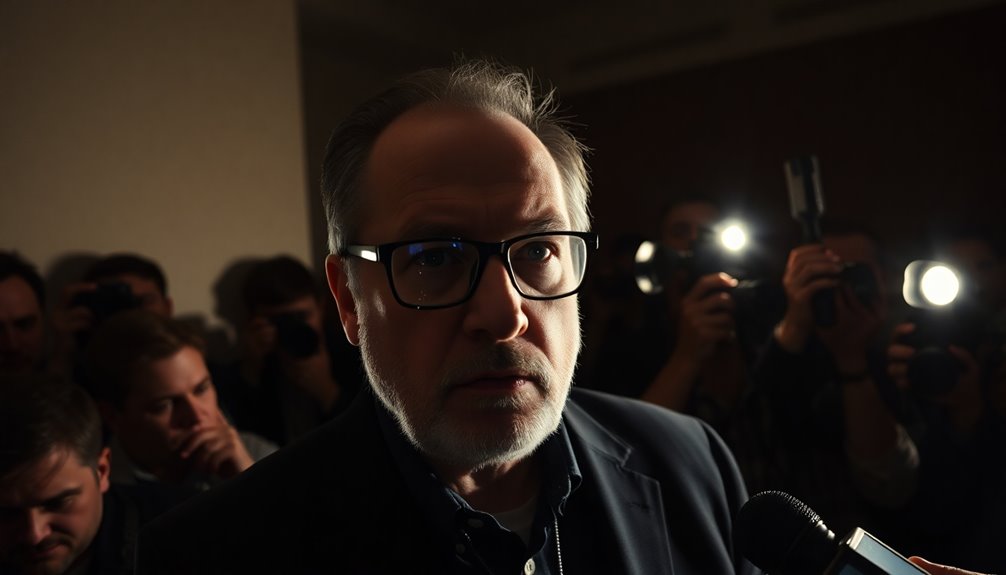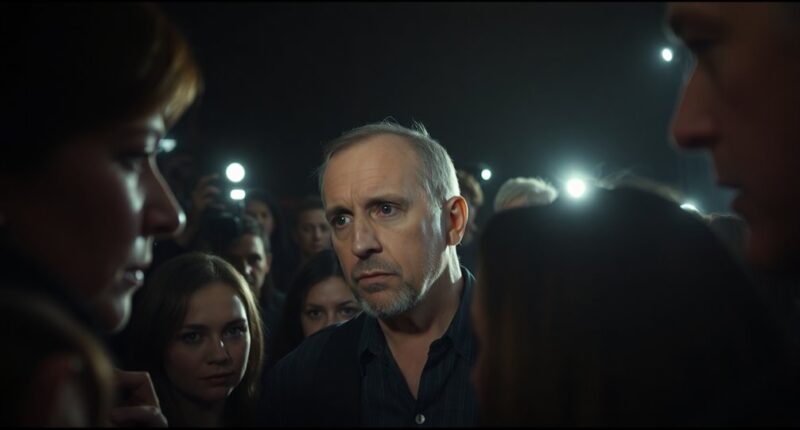Paul Schrader’s facing serious allegations of sexual harassment from a former assistant, known as “Jane Doe,” who claims years of misconduct. The claims have led to civil suits, with Schrader accused of backing out of a settlement agreement. This controversy has sparked a mixed public reaction, and his career is under threat. The situation could set important precedents for harassment cases in Hollywood. Keep an eye on developments as this story unfolds; there’s more to uncover.
Key Takeaways
- Paul Schrader faces allegations of sexual harassment and assault from his former assistant, identified as “Jane Doe” in court documents.
- Allegations include years of misconduct, creating a hostile work environment, and forced exposure.
- Schrader allegedly withdrew from a confidential settlement agreement made in February, raising questions about his commitment to resolving the allegations.
- The ongoing legal proceedings could have significant implications for Schrader’s career and the film industry’s handling of harassment claims.
- Public reaction is mixed, with discussions reflecting broader concerns about accountability and the industry’s history of misconduct.

As allegations of sexual harassment surface, Paul Schrader, the acclaimed screenwriter behind classics like “Taxi Driver” and “Raging Bull,” finds himself facing serious claims from a former assistant who alleges years of misconduct. This former assistant, identified as “Jane Doe” in court documents, has filed civil claims in New York State Supreme Court, accusing Schrader of sexual harassment and assault.
The situation escalated when it was revealed that Schrader allegedly backed out of a confidential settlement agreement reached in February, raising questions about his commitment to resolving the matter. Notably, the allegations include specific incidents of assault that detail a hostile work environment and forced exposure.
You might be wondering how this situation affects Schrader’s career. The ongoing legal proceedings aim to enforce the settlement, but details remain redacted, keeping much of the case under wraps. His attorney has acknowledged receiving the court filings but stated they hadn’t fully reviewed them at the time of comment. The request from the accuser’s legal team for privacy adds another layer to this already complex scenario.
Public reaction is mixed, reflecting the broader issues of harassment within the film industry. Many have drawn parallels to the Weinstein scandal, in which Schrader faced criticism for his comments that seemed dismissive of the seriousness of sexual misconduct.
Despite claiming his remarks were misinterpreted, the backlash has affected his reputation, and now it’s under intense scrutiny once again.
As the case unfolds, social media is buzzing with discussions about the allegations, and you can see how Schrader’s legacy hangs in the balance. The outcome of this case couldn’t only impact his future projects but also set legal precedents regarding harassment settlements in the industry.
It’s a critical moment for both Schrader and the ongoing conversation about misconduct in Hollywood. The stakes are high, and all eyes are on how this situation will resolve, with significant financial and reputational consequences at play.
Frequently Asked Questions
What Are Paul Schrader’s Most Famous Films?
When you think of Paul Schrader’s most famous films, titles like “Taxi Driver” and “Raging Bull” immediately come to mind.
These classics showcase his ability to explore complex characters and societal issues. You shouldn’t overlook “First Reformed,” which delves into themes of faith and crisis.
Other notable works include “American Gigolo” and “Blue Collar,” each reflecting Schrader’s unique storytelling style and his knack for capturing the human condition.
How Has the Public Reacted to the Allegations?
The public’s reaction to the allegations has been intense and vocal.
You’ll notice widespread outrage on social media, where many people express disbelief and disappointment.
Support for the victim is strong, emphasizing the need to believe survivors.
Industry professionals are beginning to distance themselves, raising questions about workplace safety.
Calls for accountability are echoing, urging a reassessment of standards to protect individuals in the entertainment field from harassment and abuse.
What Is the Timeline of the Allegations?
To visualize the timeline, imagine a calendar marking significant dates.
You start with May 2021, when the former assistant began working.
Fast forward to the Cannes Film Festival in 2023, where the alleged assault occurred.
By April 4, 2025, the lawsuit is filed in New York, citing sexual assault and harassment.
This timeline highlights crucial moments that shape the ongoing legal battle and public discourse surrounding the allegations.
Has Paul Schrader Made Any Public Statements?
You might notice that Paul Schrader hasn’t made any public statements regarding recent allegations.
His silence could be a tactical choice, allowing him to avoid adding fuel to the fire. Many public figures opt for discretion in sensitive situations, especially when legal matters are involved.
Not engaging on social media also suggests a desire to maintain a professional image while navigating potential repercussions and managing public perception without further complicating the issue.
What Legal Actions Have Been Taken in This Case?
In a courtroom drama that rivals the best Hollywood scripts, you’ll find legal actions unfolding like a thriller.
A motion’s been filed in New York Supreme Court to enforce a settlement agreement, while claims of breach of contract loom large.
The former assistant, Jane Doe, insists Schrader’s refusal to pay breaks their deal.
Meanwhile, his team argues the settlement’s unenforceable since it was never signed.
It’s a tangled web of accusations and defenses!
Conclusion
In the storm of accusations swirling around Paul Schrader, the shadows of his past decisions loom large. As the tides of public opinion rise, it’s clear that navigating these turbulent waters won’t be easy for him. The weight of his actions, like an anchor dragging him down, may redefine his legacy. As this narrative unfolds, the industry watches closely, hoping for accountability and change in a landscape that’s long been marred by silence.









